Meghan G. Liroff ~
Angela Harris has been here in the hospital for six hours, awaiting the results of her CAT scan. I won’t take responsibility for all of that wait time: complicated CAT scans and labs do take a significant amount of time to perform. But she didn’t need to wait the last hour.
She was waiting on me–her emergency physician–because I needed to confirm her cancer diagnosis with radiology, arrange some oncology follow-up…and find the most appropriate phraseology for “You have stage IV cancer, but you don’t meet admission criteria.”
I’ve delivered this diagnosis five times this year–and, ironically, always in that room. The cold, narrow one that echoes.
I pause outside of Room 4 and, unseen by anyone, quickly make the sign of the cross. I haven’t been to Mass since Christmas, and my father is Jewish; but for some reason, when I feel overwhelmed, I return to some foundational beliefs to ask for help. I’m about to tell a patient something invasive, painful and traumatic, so I take a personal time out beforehand, as if I were about to place a chest tube.
In situations like this, I fall back on a script. Now, carefully following that script, I walk into the room and intentionally choose my seat. To my right, flush against the wall, sits the hospital gurney, a used gown folded neatly over its rumpled white sheets. To my left, in the chair closest to the door, sits Ms. Harris, already dressed.
I head for the empty chair wedged into the corner, murmuring “Excuse me” as I brush past her in the cramped space. I sit down in the chair and angle it slightly toward her; our knees almost touch.
This is what I say:
“I have the results of the CAT scan. Is it okay to discuss those results with you now?”
Ms. Harris nods.
“When we performed the scan,” I continue, “we saw something that we weren’t expecting to find.”
Her face changes completely. The standard pall of emergency-department anxiety disappears; her eyes widen slightly, and her posture becomes perfectly erect. This is what terror looks like.
“The scan showed a mass with a certain pattern,” I say. “I’m concerned that the symptoms that prompted you to come to the emergency department are due to this mass.”
“Is it cancer?” she asks blankly.
I hate the way I say the next part. I haven’t figured out how to be honest without, at the same time, seeming to deliver a death sentence.
“I’m concerned that this mass may be cancer. I can’t diagnose cancer until we have a sample of that tissue and look at it under a microscope. Still, the pattern that we see is a very high-risk pattern.”
Silence. An eternity of silence.
From the corner of my eye, I notice her left hand. It begins to tremble, and she covers it with her right.
It’s at this point, during this kind of conversation, that I become a bit depersonalized. The situation becomes a movie scene to me. It can’t be real: This is too much pain, and the rawness of the situation comes too close to dismantling my appropriate and necessary denial of mortality. It’s human pain, but, for today at least, not mine.
“What do we do now, Doc?” she asks, holding onto her poise. She rapidly blinks her eyes, warding off the possibility of tears.
The conversation continues into territory that’s hard to discuss because of all of the unknowns. I always feel that I’m in way over my head.
“We’re so concerned about the pattern we see today that I’ve called the cancer specialist, who has reviewed the scans,” I say. “We’ve reserved an appointment for you tomorrow so that the next steps can be discussed. Your medical team will go over the tests and treatments with you.”
“So I’m going home today?”
My inner self laments the system. For Ms. Harris, I know, these next days will be full of waiting for results–of having too much time between appointments, and no guarantees.
“You don’t need to stay in the hospital,” I say. “Do you have someone at home who can be a support to you?….Your sister? I want you to talk this over with her. These next days will be hard, but you have many reasons to be hopeful. Take this one step at a time. Right now, I’ll give you a prescription for some anti-nausea medications and pain medications. Tomorrow, you’ll see the specialist.”
I make myself pause, then say, “You’ve taken in a lot of information. What questions do you have?”
“None right now.”
Feeling embarrassingly relieved, I stand up.
“All right, then; this is the start,” I say. “Please excuse me, I’ll go and get your discharge paperwork.”
She sits still, eyes downcast, waiting for privacy.
Trying not to race for the door, I take an awkward step. Only when I start to lose my balance do I realize that my foot has gotten wedged under the leg of my chair.
I fall forward, and behind me, the chair topples over and hits the floor with a metallic crash.
Ms. Harris laughs. I find myself on my hands and knees directly in front of her, bruised in body and ego.
Bending down from her chair, still smiling, she takes my elbow and scoops me up.
About the author:
Meghan Gaffney Liroff is an emergency physician at Henry Ford Medical Center and a volunteer professor at Wayne State University School of Medicine, in Detroit. “After completing residency, I returned to writing because it was my first love. I write in order to learn the humanity of medicine.” Her favorite book is The Velveteen Rabbit. Her writings can be found in FemInEm and Emergency Medicine News, Annals of Emergency Medicine and Journal of Emergency Medicine. On Twitter: @gaffmeg.
Story editor:
Diane Guernsey

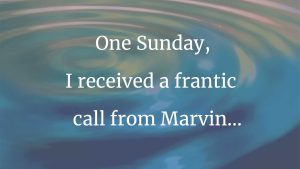
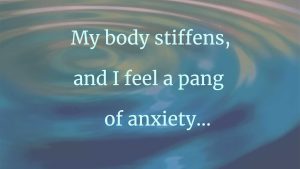
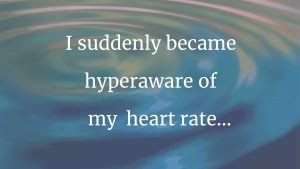
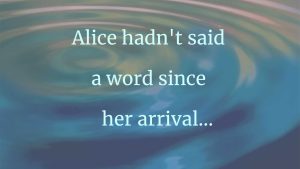
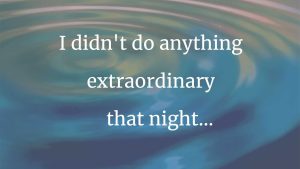
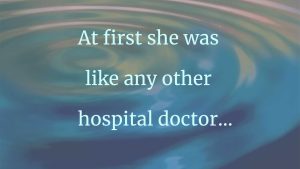
14 thoughts on “Cushioning the Fall”
Today, I’ve been cleaning out my inbox and catching up on Pulse. (That’s the bonus of this tedious task.) I worry that I use too many superlatives when I comment, but each week I’m blown away by the quality of the writing, and editing. The story was exquisitely told and beautifully crafted. I concur with the others who wrote about their gratitude for being allowed behind the eyes of the bearer of bad news. Such humanity. Thank you, Dr. Liroff.
Note to Pulse: Have you ever thought about including a section in your anthologies with some of the outstanding comments that are written each week? I think many would stand alone, with their own rawness and insight…Sheila’s for example. (If you include the title of the essay readers would be able to search for it on your website.) 😉
What a beautifully crafted poignant story. Most health clinicians have been there in some way or another. Amazing how an “accident” can turn the tables on a situation so charged with apparent negative emotion into a small positive.
Thank you for this honest and lovely essay. It is amazing how a laugh together can bring us to our shared humanity.
Exceptionally well-written story with physical and emotional details that deepen the impact of an already highly charged interaction. You’ve done what every lay reader wants most – to get a peak behind the curtain that conceals much of what we do. You’ve revealed a deeply caring, empathetic and keenly observant human being. The best kind of physician. Well done and thank you.
What a well written story! I tend to focus on the patient–me–receiving the news, not the person–you–telling the news. Because of your story, I stood in the physician’s shoes and gained a new perspective of this tense time of communication. I don’t wish you harm, but your falling did end your session with Ms. Harris on a human note; it was a reminder that we are all vulnerable. All the best, Dr. Liroff!
I have been in the seat of this patient and heard this news given in almost those exact words. I was so into my fear and so shocked by the pronouncement of what I was facing that I did not entertain any thoughts about what the doctor was experiencing. This story gives me a picture into his own fear and trepidation as the deliverer of such news. I accepted it as a gift to be given that portrayal.
Painful news for anyone to have to give. Thank you for sharing your inner turmlil, and the fall.
Today’s haiku is excellent also and in many ways fits with the story.
Thanks for this. I loved your story! I would like to have you say something about the emotional roller-coaster of the next few days, and that it is a one-day-at-a-time sort of pace, we need to have. I was glad you encouraged her to speak with her sister; to get support. But the fall was so precious, because it allowed her to help you, to find humor and possibly a bit of fallibility or mutuality of vulnerability in the situation. Thanks!
There’s nothing like a good pratfall to cheer people up. Wonderful essay.
I suspect you are an exceptional physician; your writing of your work certainly is. Thank you for this raw yet poignant honesty. Beautiful.
As a palliative care physician, I have read many stories about giving bad news. This is the first ending that surprised me. Well done.
To say thank you for your raw, poignant honesty doesn’t feel sufficient, yet I am grateful. End of life discussions move like a tableau (motionless figures representing a scene from a story). Everyone is frozen in place for moment in time. Your story reads like that. When my brother lay dying of cancer, I took an emergency flight to Phoenix and walked into the dimmed light of the hospital room. His head lay back on the pillow in the hospital bed, his eyes closed, his wife was holding his hand in hers and her head lay on their two hands. A tableau frozen in time. In the utter incongruity of the moment I found myself saying, as if there was a camera man filming it all: “I hate this part.” Knowing that life is given and taken, knowing this is what we all must face… doesn’t help. Why is that?
Thank you for sharing! I really liked the ending.
I just had to deliver the “C” news yesterday, over the phone, and I swear my patient yowled. It never gets easier!
Why would you do that over the phone? When I got my “C” news over the phone 11 years ago from the pathologist, nonetheless, I was more annoyed by his callousness than by the news he bore. My GP for over 20 years, had he received first, would have called me in and broke the news in a more compassionate way. The guy jumped right into giving me info for all the specialists including a plastic surgeon. An experience I will never forget.